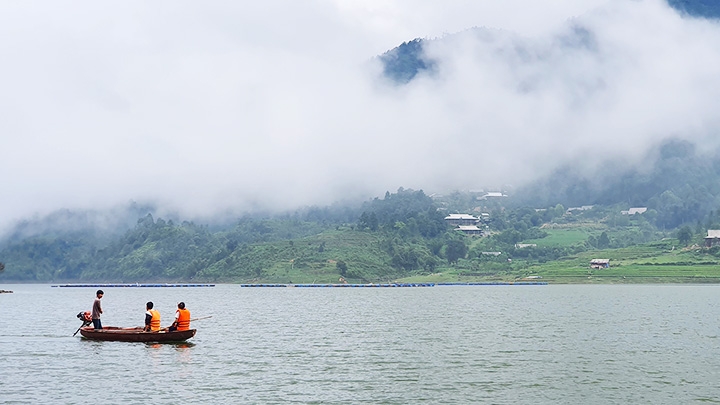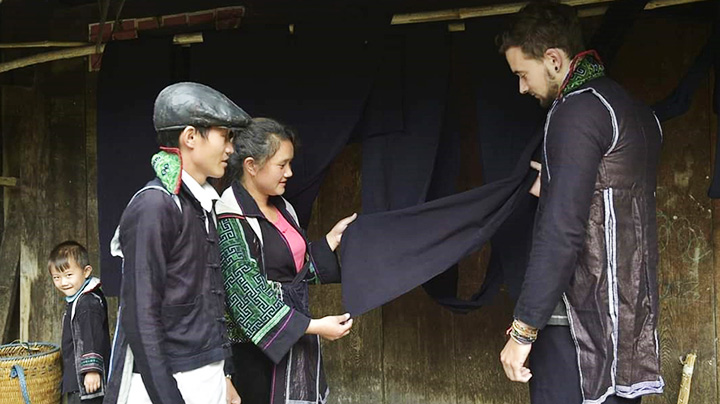
Visitors on a tour boat exploring Seo My Ty hydroelectric reservoir (Photo: NDO/Cao Huong)
Located 20 km from the Sapa’s downtown, Seo My Ty sits at a height of 1,600 metres above sea level. Thanks to its wonderful natural landscapes and cool climate all year round, Seo My Ty has been dubbed a miniature Da Lat of the north-west region.
The village covers nearly 150 hectares with nearly 100 households, who are living around a 60-hectare hydroelectric reservoir. Floating in the clouds with jade water all year round, this is probably the highest man-made lake in Vietnam.
The hydroelectric reservoir is seen most beautifully either in early morning, when the mist seeps across the lake surface followed by the first rays of sunlight shining on the water, creating a fanciful scene, or in the evening when the sun goes down and the last streaks of sunlight still linger on the shimmering lake surface.
Seo is like a treasured pearl rising at a time when Sapa town has become overcrowded with the intense development of restaurants, hotels, and tourist accommodation and establishments.
According to the head of the village, Hang A Tang, Seo My Ty was only connected to the national grid a couple of years ago. The roads have also recently been upgraded. Over ten years ago, villagers had to spend an entire day going on foot from hill to hill to travel to Ta Van commune. Although the villagers worked hard in the rice fields, they still lived in poverty and parents didn’t have enough money for their children to go to school.
The construction of the hydroelectric reservoir was revolutionary for the lives of the people in the village. Seo village has witnessed remarkable changes over recent years, and people’s livelihoods have significantly improved. Many households have taken advantage of the water source to farm salmon and sturgeon and develop tourist products and services.

Seo My Ty villagers introduce a foreign tourist to their traditional brocade products.
After learning of how to farm cold-water fishes from farmers in neighbouring communes, Giang A Tua opened his salmon and sturgeon farm four years ago. With three ponds farming salmon and sturgeon, his family earns an annual revenue of nearly VND200 million.
Visitors to the village now can camp or take a boat tour on the hydroelectric reservoir or stay at locals’ houses to explore the indigenous culture and daily practices.
The local authorities have encouraged local H’mong ethnic people to build tourist products imbued with their typical cultural features while providing them with training courses on developing tourism.
Although the Covid-19 epidemic has posed certain impacts on tourist activities in the village, locals are still optimistic about the situation. They still maintain their normal life and are taking advantage of the lull to repair or upgrade their houses.
Giang A Qua’s house is nestled under the shadow of an ancient tree in front of Seo My Ty hydroelectric reservoir. The 30-year-old man is an exemplary model of escaping poverty in Ta Van commune.
When his homestay facility first opened in 2019, it welcomed more than 1,000 backpackers a month, helping him earn a profit of over VND20 million. The figure is encouraging for Seo My Ty tourism.
Qua said that Covid-19 is not a very big concern for him and other homestay owners in the village as they want to attract visitors with their enthusiasm and hospitality. Even asthe epidemic has seen complicated developments, the villagers are still making thorough preparations for reopening their doors to tourists with even better services.
Seo My Ty somehow reminds us of Sapa in the olden days when there were few construction sites and crowds didn’t appear at every turn on the streets. Seo My Ty is a beautiful picture of natural landscapes and sincere hearts of ethnic groups who are living in this mountainous, peaceful and happy area.